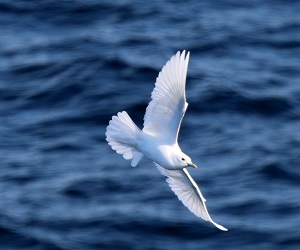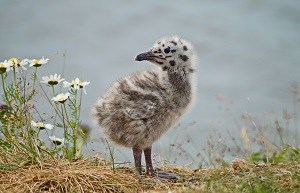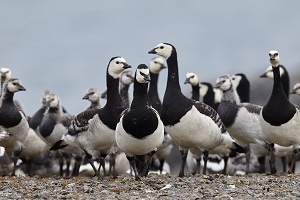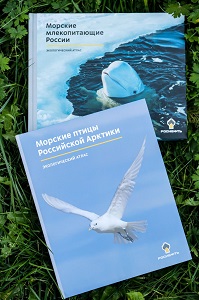Please activate JavaScript in your browser to use all interface options.
Moscow Opens Rosneft-Sponsored Flight over the Ice Photo Exhibition
17 August 2023
Rosneft in cooperation with Innopraktika, a non-governmental development institute, presented the atlas «Seabirds of the Russian Arctic». The presentation took place in Moscow at the MSU’s Apothecary Garden, where the photo exhibition «Flight over the Ice» will be on display for a month. Pictures of rare birds of the Russian North, taken in the Arctic seas by participants of Rosneft’s scientific expeditions, moved from the pages of the atlas to the greenhouse of the Botanical Garden.
 This ecological atlas introduces readers to seabird species and marine habitats of the Arctic. The book contains descriptions of 62 species found from the White Sea to the Chukchi Sea, as well as a general essay on rare birds. A separate chapter is devoted to the white gull, a rare bird listed in the Red Book of the Russian Federation. Since 2020, as part of Rosneft’s corporate programme for the conservation of key species – bioindicators of Arctic ecosystems,
This ecological atlas introduces readers to seabird species and marine habitats of the Arctic. The book contains descriptions of 62 species found from the White Sea to the Chukchi Sea, as well as a general essay on rare birds. A separate chapter is devoted to the white gull, a rare bird listed in the Red Book of the Russian Federation. Since 2020, as part of Rosneft’s corporate programme for the conservation of key species – bioindicators of Arctic ecosystems,  work has been underway to study the population of white gulls in hard-to-reach polar regions.
work has been underway to study the population of white gulls in hard-to-reach polar regions.
The atlas also provides information on the history of ornithological research, modern monitoring methods and data processing. The materials are accompanied by unique art illustrations, photographs and habitat maps. Leading Russian ornithologists worked on the project, including specialists from the Company’s Arctic Research Centre,  the Arctic and Antarctic Research Institute, the P.P. Shirshov Institute of Oceanology of the Russian Academy of Sciences, M.V. Moscow State University, Murmansk Marine Biological Institute of the Russian Academy of Sciences, Kamchatka Branch of the Pacific Institute of Geography of the Far Eastern Branch of the Russian Academy of Sciences, Institute of Biological Problems of the North of the Far Eastern Branch of the Russian Academy of Sciences, Institute of Geography of the Russian Academy of Sciences, All-Russian Research Institute of Environmental Protection.
the Arctic and Antarctic Research Institute, the P.P. Shirshov Institute of Oceanology of the Russian Academy of Sciences, M.V. Moscow State University, Murmansk Marine Biological Institute of the Russian Academy of Sciences, Kamchatka Branch of the Pacific Institute of Geography of the Far Eastern Branch of the Russian Academy of Sciences, Institute of Biological Problems of the North of the Far Eastern Branch of the Russian Academy of Sciences, Institute of Geography of the Russian Academy of Sciences, All-Russian Research Institute of Environmental Protection.  The atlas will be available for public download from Rosneft’s website once the printed version is released.
The atlas will be available for public download from Rosneft’s website once the printed version is released.
The press conference also saw the presentation of the ecological atlas «Marine Mammals of Russia», which introduces readers to the animals living in the country’s inland waters and seas. The book contains data on 47 species and describes the biology, population structure and natural and anthropogenic threats to marine mammals.  The atlas represents the results of the Company’s many years of work on studying polar bear and the Atlantic subspecies of walrus, which was carried out as part of Rosneft’s corporate biodiversity conservation programme. The results of the Company’s research can be found in a special section of the atlas.
The atlas represents the results of the Company’s many years of work on studying polar bear and the Atlantic subspecies of walrus, which was carried out as part of Rosneft’s corporate biodiversity conservation programme. The results of the Company’s research can be found in a special section of the atlas.
Note for Editors:
The «Environmental Atlases of the Russian Seas» series is a continuation of the «Russian Arctic Sea Atlases» series by the Rosneft Arctic Research Center. As part of the series, the following publications were published: «Kara Sea», «Laptev Sea», «Marine Mammals of the Russian Arctic and the Far East».
Rosneft and Innopraktika have already published the atlases «Black and Azov Seas», «Species: Biological Indicators of the State of Arctic Ecosystems» and «Barents Sea» as a part of the «Environmental Atlases of the Russian Seas» series. The series provides up-to-date knowledge in physical geography, oceanology, hydrometeorology, ecology, and marine mammals and birds’ dispersal based on the researching results of Rosneft Oil Company in the Arctic. In 2019, Rosneft together with Innopraktika, a non-governmental development institute, published a unique atlas «Russian Arctic. Space, Time, Resources».
With the support of Rosneft, one of Russia’s largest Moss Ground opened in MSU’s Apothecary Garden. The unique exhibition features more than 40 species of midland mosses, including rare and endangered species.
Rosneft
Information Division
August 17, 2023

-315xx70.png)

